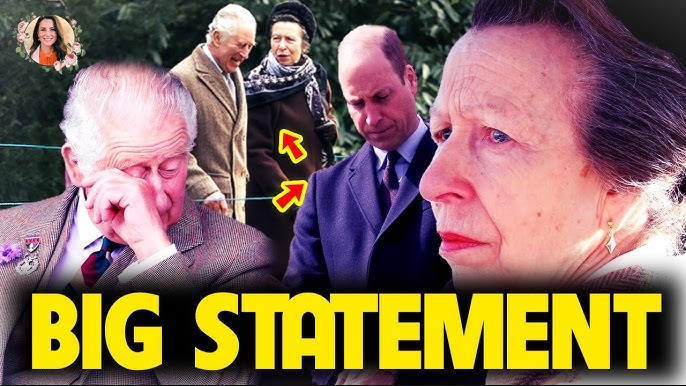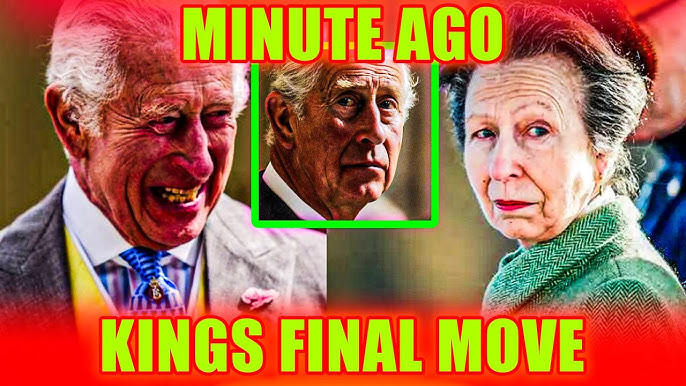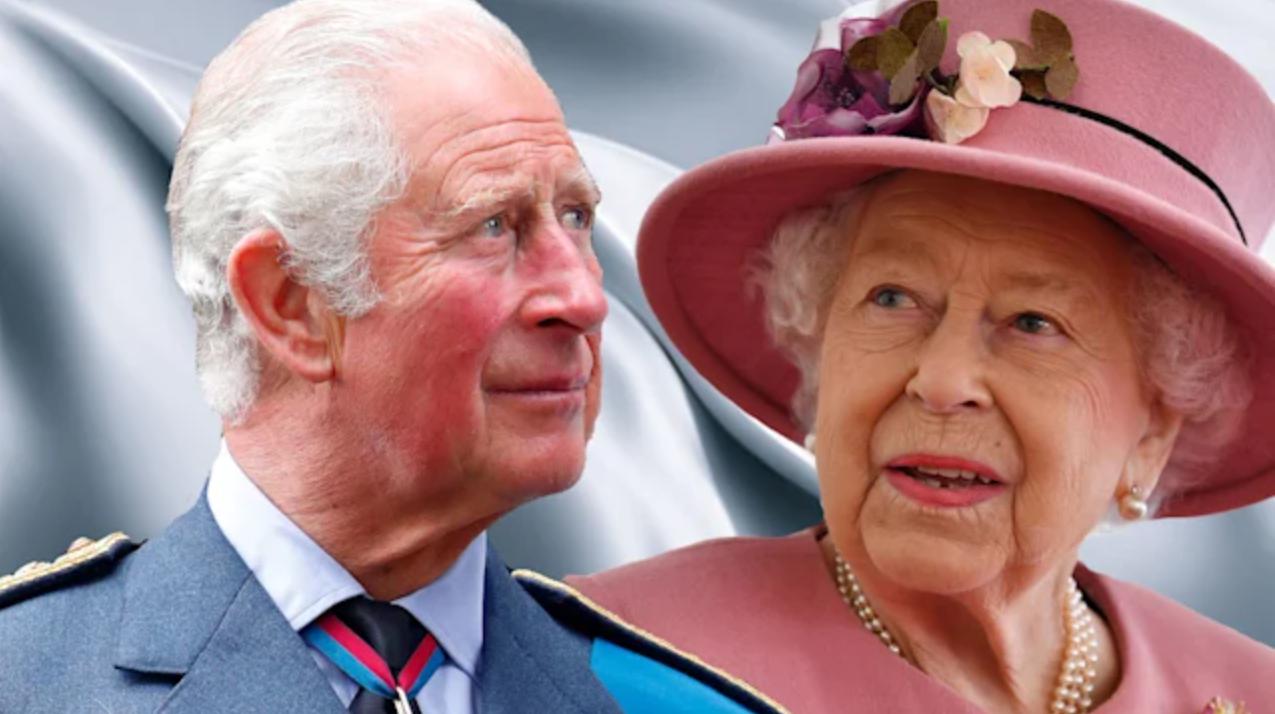Today we bring you some news: Princess Anne is heartbroken as King Charles’s reign goes far from the late Queen’s will. According to a confidential source, King Charles’s turbulent reign is troubling Princess Anne. Insider sources suggest that Princess Anne is seeing a transformation in her brother that is both tragic and inevitable.
King Charles, who once commanded respect with ease, now seems slightly weary from the passage of time.
The shadows of Buckingham Palace seem to lengthen each day, surrounding the royal family in a somber ambiance as they face the reality that Charles is no longer the person he once was.
His formerly robust health is becoming a concern, and public trust in his leadership qualities is waning.

Traditionalists, steadfast in their belief in the monarchy’s enduring traditions, urge Charles to withstand the forces of change. For them, the crown signifies a sacred duty, unwavering and impervious to modern influences. Any suggestion that Charles would abdicate in favor of William seems to contravene the foundational ideals of the monarchy.
In contrast, an opposing perspective echoes throughout the halls of power. This perspective is held by reformists and a citizenry desiring change. People view Prince William, known for his youthful energy and modern outlook, as the guardian of the monarchy’s future—a ruler for a new era prepared to steer the institution toward a period of enhanced public connection. They want to establish a royal family that is more friendly and accessible, reflecting modern ideas rather than traditional norms.
An insider source claims that these opposing forces have trapped Princess Anne. As the King’s sister, she grapples with conflicting loyalties between familial duty and her deep understanding of the Crown’s obligations. She recognizes the weight of history upon her, a past that has always demanded the monarchy to represent continuity, stability, and steadfast tradition. Nonetheless, Anne recognizes the power of change. She has seen a monarchy that has reluctantly adapted to the exigencies of modern society.

The public’s perception of the royal family has significantly changed, leading to a shift in expectations. The compassion of a sister is evident; a confidential source said that Anne had profound empathy as she saw her brother contending with these challenges. She understands that Charles’s commitment to the throne stems from a sense of duty that surpasses mere ambition for power or status, and his love for the monarchy stems from a profound sense of obligation that surpasses personal desires.
Nonetheless, his health is declining, and every public appearance underscores the relentless progression of time. The strain is evident in his every movement and utterance. The King’s once energetic and confident demeanor gradually wanes, paralleling the public’s diminishing faith in his leadership qualities.
The mounting demand to relinquish the throne, beyond royal succession, is essentially a matter of the monarchy’s survival. Many acknowledge the end of Charles’s reign not due to a lack of leadership but because William holds the key to the future. He symbolizes a new generation, encapsulating the grandeur of the monarchy and the progressive ambitions of an evolving society.

The public’s focus has shifted to William, seeing him not only as the heir apparent but as a sovereign ready to revitalize the institution.
An excruciating decision looms. A historian says that the circumstances are agonizing for Anne. She has dedicated her life to the monarchy, assisting her brother throughout his rise to the throne and observing his steadfast dedication to his duties. Nonetheless, the global community now calls for his resignation, and Anne must confront the harsh truth that Charles’s rule may be approaching its conclusion.
During serene moments, she reflects on their shared memories of youth, remembering episodes of joy and ambitions for the future. Those memories are now bittersweet, overshadowed by the stark reality of duty and the weight of the crown. Anne’s loyalty to her brother is unwavering, but she comprehends, perhaps more profoundly than anyone else, the hardships that the monarchy imposes on its bearers—the isolation, the relentless scrutiny, and the constant need to represent both a symbol and a human being.
Charles has shouldered these responsibilities throughout his life, and now, with his declining health, they have become more burdensome. However, the scrutiny extends beyond Charles. The monarchy itself finds itself at a crucial juncture. We cannot ignore the need for a modern and relevant royal family. The institution must advance, and Prince William epitomizes that advancement.
For many, he epitomizes the future of the monarchy—a future where tradition and innovation live together. The weight of expectations is substantial. Even William, despite his enormous aptitude, experiences substantial pressure. The expectations placed upon him are significant; his role as a model king is to preserve the monarchy, modernize it for the 21st century, and uphold its enduring reverence.
The task is almost insurmountable. Having seen the weight the crown has placed upon her brother, Anne is apprehensive about her nephew. As the world watches, Anne maintains unwavering support for her brother. She is the one who listens during the late hours, offers subtle support, and aids him in shouldering the unbearable weight of his responsibilities.

She stays steadfast while inwardly recognizing that the time for change is imminent. Princess Anne mourns not just for her brother, but also for the kingdom. The kingdom, a longstanding institution, is currently facing one of its most significant challenges. The world is progressing, and so the monarchy must likewise evolve.
While it is difficult to accept, Anne understands that William embodies the future and sees Charles’s reign as a transitional phase—a bridge between the past and the future. Polarization characterizes the divisions within the palace and public opinion. Traditionalists say that Charles must remain steadfast, seeing his potential abdication as a danger to the monarchy’s stability. They see the crown as a symbol of continuity, a bastion of history that must not succumb to the whims of modernity. They view Charles’s reign as a symbol of the monarchy’s enduring heritage, emphasizing the need for utmost caution in any power transfer.
Conversely, reformists and a growing segment of the population see an opportunity for rejuvenation. They argue that William represents a chance to modernize the monarchy, making it more relatable and accessible to the public. They contend that the monarchy must evolve to retain significance in a rapidly changing world, and William embodies such evolution. His youthful vitality and modern viewpoint resonate with a generation that values progress and inclusivity.
Experts on royal affairs assert these perspectives, highlighting the complex balance the monarchy must preserve between tradition and modernity. Historian Dr. Emily Carter notes that the monarchy has perpetually been an institution rooted in tradition, yet it has also exhibited an ability to adapt when necessary. The present challenge is to identify a means to honor the past while welcoming the future.
Royal critic James Harrington contends that William’s ascension, while unavoidable, necessitates meticulous oversight. The monarchy’s authority lies in its continuity; however, it must also reflect the values of the people it represents. This is a pivotal moment, and its administration will impact the institution for years to come.
As the uncertainty surrounding King Charles’s reign escalates, Princess Anne senses the subtle strain tightening around her. The monarchy, an institution rich in historical significance, is more susceptible, faced with the unyielding weight of history and the advancing pressures of modernity.
Anne suddenly becomes the emotional cornerstone for her brother and family as they confront the impending catastrophe. The external pressure becomes unbearable. The media, once respectful and measured in their assessments, have become more outspoken and assertive. Headlines need clarification over the future of the monarchy. Social media is abundant with speculation promoting Prince William as a prospective leader to assume the throne and usher in a new era.

Every day, the relentless need for change intensifies, deepening the silence within the castle. Insider sources suggest that Anne and William have had confidential conversations. She sees in him a reflection of their father—identical calm, fortitude, unwavering commitment, and also a deep-seated exhaustion. William understands that he will eventually inherit the crown, but not in this manner or prematurely. He adores his father, and the idea of usurping his job while Charles is still living is unimaginable—a violation of their family values.
Nonetheless, the demands for his promotion grow more indisputable. A health crisis is looming. As the months go by, the threat from all sides markedly increases. The palace has evolved from a simple dwelling into a fortified stronghold. Cers secretly plot, formulating measures to tackle the growing issue. Simultaneously, the clock ticks down to an inevitable confrontation—the moment when Charles must decide whether to endure or cede his position for the sake of the monarchy.
The historian asserts that under this mounting strain, Princess Anne surpasses her position as a sibling. She has assumed the role of mediator and counselor, uniquely positioned to communicate truth to both Charles and William without fear of retaliation. Her role is complex, balancing her love for her brother with her recognition of the pressing need for change.
She progressively allocates time to William, discreetly equipping him for any contingencies. They navigate the gardens before dawn, conversing about obligation, history, and the uncertain future that lies ahead. She explains to him that bearing the crown requires grace and modesty rather than being a reward.
As tensions escalate, an unexpected occurrence significantly unsettles the monarchy—a health issue that, while initially modest, nevertheless causes significant turmoil within the family. The hospital quickly admits King Charles, keeping his health confidential from the public. Nevertheless, inside the palace, the reality is clear: the King’s health is declining more swiftly than anticipated.
The palace maintains a tense and subdued atmosphere in the weeks following King Charles’s health issue. Each day, there are more muted discussions of his ailment, yet the royal family persists in projecting a composed and cohesive image. The public





